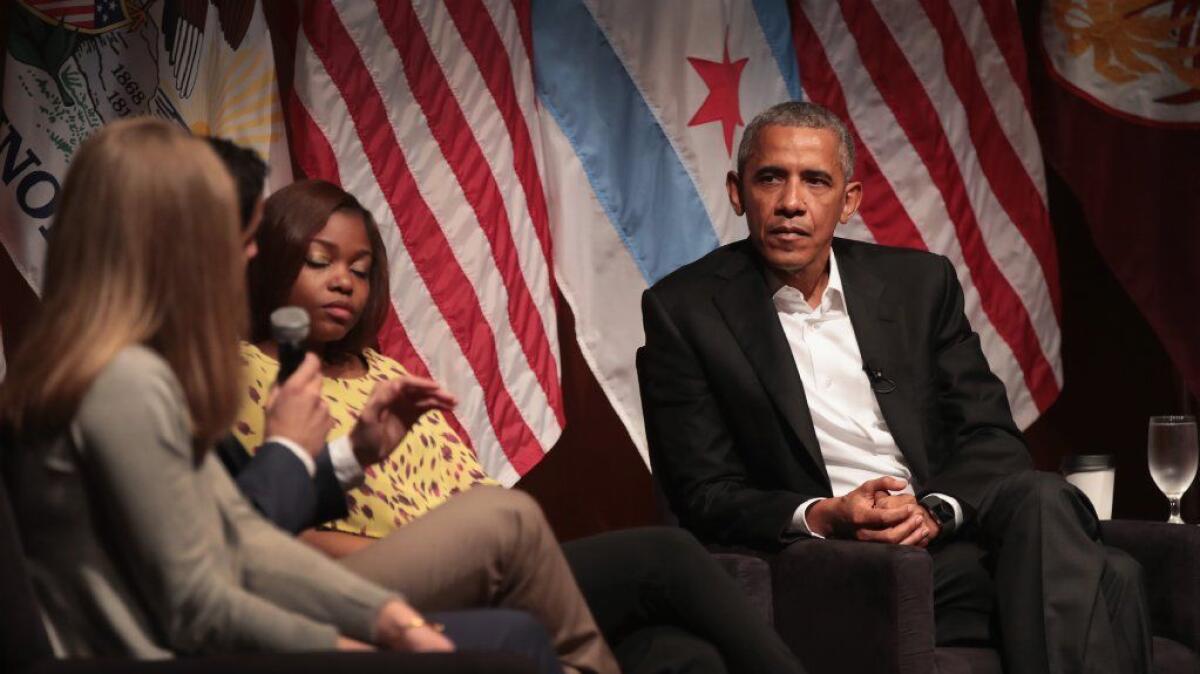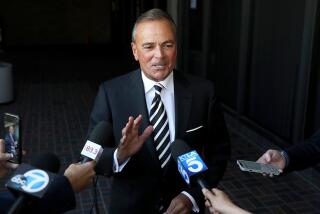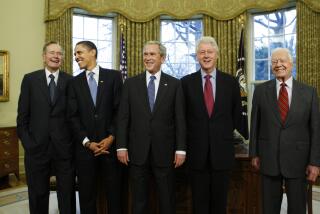Opinion: $400,000 for an Obama speech: Tacky but not corrupt

Should we be scandalized by reports that former President Barack Obama will be paid $400,000 to deliver a speech at a healthcare conference sponsored by Cantor Fitzgerald, a Wall Street investment bank?
I don’t think so, at least not for most of the reasons offered by the prosecution.
One count in the “indictment” is that accepting such a generous speaking fee looks like influence-peddling. But as an ex-president, Obama has limited influence to peddle. True, as Jason Willick of The American Interest noted, he continues to be a de facto leader in the Democratic Party who can “make key introductions, put things on the agenda.”
But after eight years in the White House, Obama probably already knows a lot of the people he would run into on the Wall Street speaking circuit. Even if that weren’t the case, the more speeches he gives, the larger the number of people he theoretically would be expected to introduce to Nancy Pelosi or Chuck Schumer. He’d be spread pretty thin even if he did want to do the bidding of his paymasters or audience members.
In the Washington Post, Aaron Blake moves beyond the influence-peddling idea to offer “4 Reasons Obama’s $400,000 Wall Street Speech Is a Bad Idea.” No. 1 is that “it continues to set a dubious precedent” of ex-presidents cashing in on their previous service. This, Blake says, puts future presidents on notice “that such payments are on the table, and it risks coloring their decisions with regard to Wall Street and special interests.”
Hmm. Even if Obama declared a vow of silence, there would still be recent examples of presidents who accepted fat speaking fees after they left office — Bill Clinton and George W. Bush. They could serve equally well as reminders to an ethically challenged president that ex-presidents can make money giving speeches.
Blake’s second argument is that Obama’s fat speaking fee violates the spirit — it obviously doesn’t violate the letter — of laws prohibiting ex-government employees from lobbying their former colleagues. The underlying principle, he says, is deterring government employees from using their positions to guarantee a “future payday” in the private sector. This sounds a lot like Blake’s first argument; it still doesn’t fit Obama.
Blake’s third argument is that “Democrats are trying to be the anti-Wall Street party” and Obama’s speaking fee complicates that rebranding. Having won the presidency for the Democrats twice, I’m not sure Obama owes the party anything.
Blake’s closing argument is headlined: “Obama Himself Discussed the Corrupting Influence of Such Arrangements in His Book.” Blake notes that in his 2006 book “The Audacity of Hope” Obama described how hanging out with “people of means” made him “more like the wealthy donors I met.” But surely the time to worry about Obama being compromised by contact with the hyper-affluent 1% was when he was president.
You can find these arguments unconvincing – and obviously I do – and still understand why so many people are dismayed by Obama’s acceptance of this humongous speaking fee. Relative to other positions of power in this society, the presidency isn’t a well-paid position. That’s why it’s called “public service.” Yet, as noted above, recent former presidents have been eager to accept large sums of money to speak about that service to select audiences.
Now Obama, the epitome of good taste when he was president, has signaled that he too is ready to begin cashing in. That may not be corrupt or a threat to honest government, but it strikes us as tacky – tackier somehow than accepting a lucrative contract to write a book, though that also amounts to capitalizing on public service. But our revulsion isn’t moral; it’s aesthetic.
Follow the Opinion section on Twitter @latimesopinion and Facebook
More to Read
A cure for the common opinion
Get thought-provoking perspectives with our weekly newsletter.
You may occasionally receive promotional content from the Los Angeles Times.











